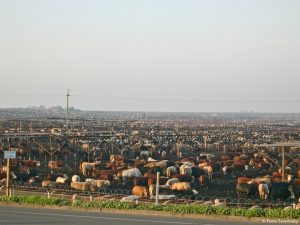 The unsustainable course of human evolution over the past century and a half has been driven on by an overarching, undeniable domination of market mentality that pervades all areas of life, including the stuff of our very sustenance: food. The expectation, or even faith, that a market can regulate itself, correct itself, and provide its own checks and balances is responsible for the degradation of ecological and human health, and for promoting ever greater inequalities around the globe. In direct relation to the food system, Michael Carolan discusses these failures of the market at length in chapter two of his book “The Real Cost Of Cheap Food”. Among others:
The unsustainable course of human evolution over the past century and a half has been driven on by an overarching, undeniable domination of market mentality that pervades all areas of life, including the stuff of our very sustenance: food. The expectation, or even faith, that a market can regulate itself, correct itself, and provide its own checks and balances is responsible for the degradation of ecological and human health, and for promoting ever greater inequalities around the globe. In direct relation to the food system, Michael Carolan discusses these failures of the market at length in chapter two of his book “The Real Cost Of Cheap Food”. Among others:
- Lee Kyung Hae commits suicide and incites a movement of small farmers in protest of the systematic way the globalized food system destroys a way of life and livelihood.
- The “urban bias” in development and policy reforms that virtually guarantees a market as a result of food dependency, and coerces a population into an economic system they may or may not want, all without adequate access to democratic participation or influence.
- The inherently uneven playing field of the so-called free market induced by, and for the benefit of hegemonic power structures in more wealthy economies.
- The corrosive effects of food aid for the developing economies who receive it.
What is so surprising about this dominance of market forces, is how entwined it is in how we think and, more consequentially, how we rationalize what we think. Consider that it seems to be a root cause of so many problems – from the overconsumption in the Global North to the devastation that that causes in the Global South; from the Great Acceleration itself to the massive health crisis initiated by bad food science, questionable policies, and deceptive marketing. Yet paradoxically, market mentality is most frequently used to promote solutions to its own inherent deficiencies. It’s now quite common to hear the phrase “vote with your wallet” – the idea that we might consume our way out of the problems we face. Carolan’s book is another good example. Although his arguments clearly point out the drawbacks of liberalized trade and the dramatic consequences of cheap food, the title (and much of the content) reveals how thoroughly market reasoning pervades our collective psyche. Everything, including the system’s own shortcomings, are measured in the now familiar language of “cost”. Perhaps there are some things – especially those things that are vital to life – that should be considered with a different metric than what we use to determine relatively trivial choices like buying a new pair of shoes, or adding the leather option on a new car.
 The work of Michael Maniates further brings into focus how this market domination has delivered us into an era of individual responsibility to clean up the mess caused by the collective catastrophes of food industrialization. While I certainly agree that every little bit helps, inane solutions like planting a tree, keeping your car’s tires inflated properly or “agonizing over paper or plastic”, to borrow Maniate’s words, “leave little room to ponder institutions, the nature and exercise of political power, or ways of collectively changing the distribution of power and influence in society”. In other words, pondering the systems that perpetuate the problems is more likely to lead to viable solutions than any unorganized individual activity.
The work of Michael Maniates further brings into focus how this market domination has delivered us into an era of individual responsibility to clean up the mess caused by the collective catastrophes of food industrialization. While I certainly agree that every little bit helps, inane solutions like planting a tree, keeping your car’s tires inflated properly or “agonizing over paper or plastic”, to borrow Maniate’s words, “leave little room to ponder institutions, the nature and exercise of political power, or ways of collectively changing the distribution of power and influence in society”. In other words, pondering the systems that perpetuate the problems is more likely to lead to viable solutions than any unorganized individual activity.
Photo Source:
“Antibiotic-Resistant Bacteria and Factory Farming”. Farm Sanctuary Blog, 01/2016, Website, accessed:07/2017
“Paper…or…Plastic”. Would I Rather, 02/2012, Website, accessed: 07/2017

Thanks for your post. You bring up some good points in your post, namely that counting on the free market to regulate itself is flawed thinking that has resulted in much strife and inequity around the world. The free market might have its merits on paper, bringing to mind nostalgic thoughts of the American dream, but in reality, capitalism drives people in pursuit of ever-increasing profits, which is not sustainable. Neoliberalism has had other negative effects on our society, as well. This “era of individual responsibility” you mention in your post, for instance. Not only is it up to the individual to counteract the effects of food industrialization, it is up to the individual to overcome every obstacle in life, no matter how insurmountable. People who are oppressed could thrive if they would only change their attitude and pull themselves up by their bootstraps. As you suggest in your post, this individualistic view is highly problematic as it shifts focus away from the social and economic systems that actually hold the power. As we have learned in this class and other courses in ISS, our society is a system and the problems we face will need to be thought about and solved systemically rather than by any one person choosing paper over plastic bags.